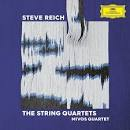The music, the performances and the meaningful musical synergy present on this revelatory recording of Steve Reich's The String Quartets (DGG Deutsche Grammophon 5385) by the Mivos Quartet helps us experience in good order some of the masterpieces that confirm why Steve Reich is no doubt among the very most important of Minimalist Composers but also aside from style a towering musical figure of our era.
And perhaps that is because he turned to the String Quartet with a certain amount of awe based on the legacy it represents. And so surely there is a seriousness to these works that goes along with the composer's commitment to it as a tradition of high art. "Different Trains" views an experience of routes in an embattled world, "WTC 9/11" confronts the Twin Towers tragedy of 9-11. "Triple Quartet" has a somewhat more abstract way about it, but it too is as serious as anything Reich has written. Many will note how Reich came to notoriety with his electronic essays that utilized a musically inspired and very emotional snippet statement of a preacher and a protester, respectively, as the motif that expands and develops out of its temporal and sequential manipulation on the works entitled "Ain't Gonna Rain" and "Come Out." So too "Different Trains" and "9/11" take speech phrases and make of them the principle motifs, but with a more elaborated instrumental development alongside them. In this way Reich obtains a high seriousness rarely approached in the quartet literature.
Taking that basic speech melody idea the speech-vocal narratives for "Different Trains" and "WTC 9-11" underscore the affect frame of the situation, on "Trains" via the conductor and passengers speaking and then indirectly reflecting on the different train routes of relevance to the situation as before, during and after the war. On the other hand "WTC" allows those who experienced the tragic events of the World Trade Center to create melodic phrases coming out of the live and reflective remarks in the witnesses' unfolding narrative. And so the sadness and terror finds a kind of natural musical resonance, most unusually so.
The latter day Reich as heard here does not always depend on a kind of hypnotic excitement (as heard especially in earlier works) so much as a sober, almost Kaddish-like recognition and tragic grieving, and a more open flying against the face of a supremely tragic Second World War. All this takes place within the especially spatial aspect of the arena via European and American biographical scenography allowing for a more landscaped world unfolding as by definition of course it was.
The music repeats as earlier Reich works, yet it does so more in line with the linearity of Modern Classical Post-Romantic phasings. And in the process too Reich's inventive brilliance is allowed to reach out at a great distance and form a kind of stream-of-conscious ritual melodics reflecting the larger sadness of our eras as we look back. Like Penderecki's "Threnody for the Victims of Hiroshima" there are outcries of remonstrance, sheer agonistics on the horror of the world going so wrong. And so there can be incredibly moving rhythmic melodic thrusts born of repetition and its lack, so that a tension between again and not-again is felt much more prolifically compared to some of his earlier work. And the agony finds its further counterpart in the air-raid sirens and telephone emergency signals that form a melodic fulcrum point. There are moments of dancelike intensity, frozen anguish and halting but inevitable remembrance.
"Different Trains" especially moves me in how the whistle, steam engine pulsing rhythms and ritual pronunciation of route itineraries affirm the feeling of rail travel in those days. So of course the regularity of repetition on rail movements finds a natural analog in the Reichian melodic-hypnotics as effective as any of the strong inventive materials we hear in the course of the unfolding of the three quartets.
The Mivos Quartet give us the sort of high-energy benchmark performances these works demand and so the CD is highly landmark. Do not miss it. To hear a stream of it all start with this link https://www.youtube.com/watch?v=8cUpf1CxncY

No comments:
Post a Comment